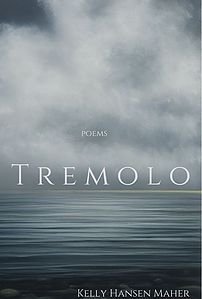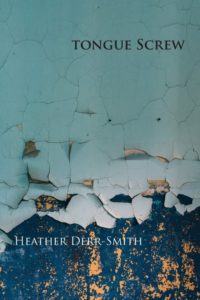In new collections, poets Kelly Hansen Maher and Heather Derr-Smith write about lives as women, Hansen Maher speaking to the pain of repeated miscarriages and Derr-Smith exploring relationships and female sexuality. Oddly enough (for me, not the poets), as I read these collections, I found myself considering recurring images of end-times.
Perhaps this isn’t so odd: miscarriages are about endings, accompanied by heartbreak and pain; and what Derr-Smith describes suggests, in part, the pain and loss of endings that can be accompanied by violence. Of course, my images of end-times could be nothing more than reflections of my own anxieties about the presidential election.
Tremolo, by Hansen Maher, is arranged like a musical composition. A tremolo is the rapid repetition of a sound to produce a tremor-like effect, and for Hansen Maher, that tremor-like effect is the result of repeated miscarriages. In the composition that is Tremolo, we find an overture, variations, a chorus, a fugue, progressions, and an interlude. This poem is from the “Progressions” section:

morning when I mouth
the old alphabet back
to life
I want the resuscitation
and the rupture
mouth that lopes over gaps and grants
access
to meaning
because I never believed
there were reasons
what word, I ask
with my tongue in its cheek,
what word for the more we seek return to,
each night in our oceans of sleep,
what word for the wrenching away

Kelly Hansen Maher
These are the words of a mother, repeatedly searching for meaning and the answer to “Why?” in waves of emotional pain, “each night in our oceans of sleep.”
Maher received a BFA degree from Emerson College, a JD degree from the University of Minnesota, and an MFA degree from Hamline University. She teaches creative writing with the Minnesota Prison Writing Workshop and lives in Grinnell, Iowa.
The poems are powerful, and none more so than those in the concluding section, “Sonar, ” a series of untitled poems simply called “Acupuncture Reveries.” These poems are repetitions of needle pricks representing the search for healing and recovery.
If this is a musical composition, my call is “Encore!”
In writing about relationships and female sexuality, Heather Derr-Smith employs a variety of metaphors in Tongue Screw, including powerful images of Sarajevo and the Bosnian War of the 1990s. Many of the poems are about loss and abandonment, such as by an abusive stepfather. Others use biblical imagery. But the poems with the Sarajevo images are especially striking.
I saw a house being carried down river.
It started in one place and ended in another.
Wild dogs, nipples black with new birth,
shuffle back at the edge of the wood.
From the bridge in view of the house, I threw
every gift you ever gave me: shawl
of pink rabbit fur, the complete works
of Sylva Plath in Bosnian, a framed photograph
of my daughter and your daughter (hard to tell
who is who, except by instinct). The bridge
sways and trembles, flood waters too high,
current too strong. No Thru Traffic.
Orange cones warding us off. Ten years
after the war and still Opasma Zona,
Danger Zone, everywhere, impossible
to leave it behind. Heat lifts from the guts
of dead fish and the wreaths of trash
on the water’s edge, flood still rising
about to burst its crest.

Heather Derr-Smith
One can immediately picture the scene—the bridge, the flood below, the tossing of the gifts, the bridge swaying and trembling. The war is long over but it’s not; the failed relationship is over but it’s not as well. And the flood is still rising.
Derr-Smith received a B.S.A. degree in art history from the University of Virginia and an MFA degree from the Iowa Writer’s Workshop. She has previously published two collections of poetry, Each End of the World (2005) and The Bride Minaret (2008).
Tongue Screw evokes the end-times of relationships, as Tremolo evokes the end-times of a miscarriage.
But like all end-times, something comes after. And poets will write about that as well.
Photo by Chris Hays, Creative Commons, via Flickr. Post by Glynn Young, author of the novels Dancing Priest and A Light Shining, and Poetry at Work.
__________________________

“I require all our incoming poetry students—in the MFA I direct—to buy and read this book.”
—Jeanetta Calhoun Mish
- Poets and Poems: Katie Kalisz and “Flu Season” - April 15, 2025
- Poets and Poems: Michelle Ortega and “When You Ask Me, Why Paris?” - April 10, 2025
- Robert Waldron Imagines the Creation of “The Hound of Heaven” - April 8, 2025


Maureen says
Seconding Bethany. Lovely work by these poets. And I like the cover of Derr-Smith’s collection.